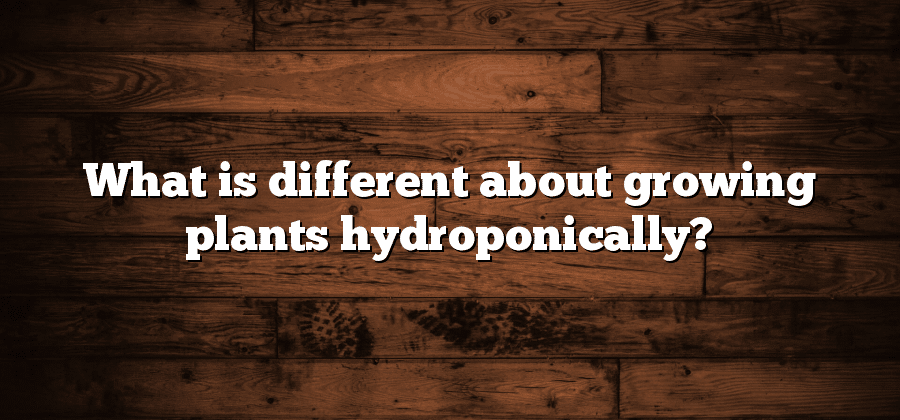Advantages of Hydroponic Plant Growth
Hydroponic plant growth offers various advantages over traditional soil-based cultivation methods. One major benefit is the ability to control and optimize the plant’s environment. In a hydroponic system, factors such as light, temperature, and humidity can be precisely regulated, allowing for a more consistent and optimal growing environment. This control over the growing conditions can result in improved plant health, faster growth rates, and higher yields.
Another significant advantage of hydroponics is the enhanced nutrient absorption by plants. In a hydroponic system, nutrients are dissolved in water and delivered directly to the plant’s roots. This allows for more efficient nutrient uptake, as the plants can access the nutrients without competition from other organisms or nutrient loss through leaching. As a result, hydroponically grown plants often exhibit healthier and more robust growth, with increased nutrient content and reduced susceptibility to nutrient deficiencies.
Benefits of Controlled Environment
In the pursuit of sustainable agriculture, creating a controlled environment for plant growth has proven to be a game-changer. By providing plants with the optimal conditions they need to thrive, growers can maximize yields and achieve consistent, high-quality produce. Such controlled environments typically involve the regulation of temperature, humidity, and lighting, among other factors, to mimic the ideal conditions required for plant growth.
One of the primary benefits of a controlled environment is the ability to extend the growing season and cultivate crops year-round. By eliminating the reliance on climate and weather conditions, growers can produce fresh, locally grown produce even in regions with harsh climates or limited growing seasons. This not only ensures a steady supply of food throughout the year but also reduces the need for long-distance transportation, thereby cutting down on carbon emissions associated with food transportation. The controlled environment also allows for the cultivation of crops that would otherwise be unsuitable for a particular region, providing greater variety and availability of fresh produce.
Optimal Nutrient Absorption
Hydroponic plant growth offers numerous advantages, and one of the key benefits is achieving optimal nutrient absorption. In traditional soil-based farming, plants obtain nutrients from the soil through their roots, which often results in uneven distribution and potential nutrient deficiencies. However, in a hydroponic system, nutrients are directly delivered to the plant roots through a nutrient-rich water solution. This allows for precise control and customization of the nutrient content, ensuring that plants receive the exact nutrients they need at the right time. As a result, plants grown hydroponically have the potential to achieve superior nutrient absorption compared to traditional soil-based methods.
The ability to optimize nutrient absorption in hydroponics offers several advantages for plant growth. Firstly, it promotes faster and healthier growth, allowing plants to reach their full potential more efficiently. When plants receive all the necessary nutrients in the perfect balance, their growth and development can be accelerated, leading to higher yields in a shorter period. Additionally, optimal nutrient absorption in hydroponics minimizes waste and resource usage. Unlike soil-based farming, where nutrients can be lost or depleted in the ground, hydroponic systems recirculate and reuse the nutrient solution, resulting in reduced water and fertilizer consumption. This not only conserves resources but also contributes to a more sustainable and environmentally friendly approach to agriculture.
Water Conservation Techniques
One of the key benefits of hydroponic plant growth is its ability to conserve water. Unlike traditional soil-based agriculture, where a significant amount of water is lost through runoff, evaporation, and inefficient irrigation methods, hydroponics offers a more efficient and controlled approach. By delivering water directly to the plant’s root system, hydroponic systems minimize water waste and ensure that every drop is utilized effectively. This not only helps to conserve water resources but also reduces the overall water demand for growing plants.
Furthermore, hydroponic systems can be designed to recycle and reuse water, adding to their water conservation capabilities. By implementing proper filtration and sterilization methods, the water used in hydroponics can be treated and recycled, saving both water and cost in the long run. This closed-loop system allows for a more sustainable approach to plant cultivation, as water can be continuously circulated, reducing the need for frequent replenishment. Overall, water conservation techniques in hydroponics not only promote environmental sustainability but also provide economic benefits for growers.
Elimination of Soil-Borne Diseases
One of the significant advantages of adopting hydroponic plant growth is the elimination of soil-borne diseases. Unlike traditional soil-based gardening, hydroponics relies on nutrient-rich water solutions to nourish plants, bypassing the need for soil altogether. This eradicates the risk of soil-borne diseases, which can be devastating for crops. By removing the medium in which these diseases thrive, hydroponics provides a clean growth environment, ensuring healthier and disease-free plants.
In hydroponic systems, plant roots are suspended in nutrient-rich water, creating an optimal growing environment that is unfavorable for the development of soil-borne diseases. Without the presence of soil, which can harbor pathogens and harmful microorganisms, plants are less susceptible to infections. This disease-free environment allows plants to focus their energy on growth and development, resulting in higher yields and healthier produce. By embracing hydroponic plant growth, farmers and gardeners can mitigate the risks associated with soil-borne diseases, safeguarding their crops and enhancing overall productivity.






